|
„Don't worry, I can fix it!“ Umweltbesorgnis und umweltbezogene Wirksamkeitserwartungen als mögliche Einflussfaktoren für ökologisch nachhaltigen Lebensmitteleinkauf im Alltag von Privatpersonen
Chaumont, Geneviève Marie
|
Weitere URL:
|
https://ipu-ev.de/abschlussarbeiten/
|
|
URN:
|
urn:nbn:de:bsz:180-madoc-650187
|
|
Dokumenttyp:
|
Abschlussarbeit
, Master
|
|
Erscheinungsjahr:
|
2023
|
|
Ort der Veröffentlichung:
|
Mannheim
|
|
Hochschule:
|
Universität Mannheim
|
|
Gutachter:
|
Tobies, Svenja
|
|
Sprache der Veröffentlichung:
|
Deutsch
|
|
Einrichtung:
|
Fakultät für Betriebswirtschaftslehre > Sustainable Business (Edinger-Schons 2015-2022)
|
|
Lizenz:
|
 Creative Commons Namensnennung 4.0 International (CC BY 4.0)
Creative Commons Namensnennung 4.0 International (CC BY 4.0)
|
|
Fachgebiet:
|
000 Allgemeines, Wissenschaft
300 Sozialwissenschaften, Soziologie, Anthropologie
330 Wirtschaft
|
|
Fachklassifikation:
|
JEL:
D12 Consumer Economics: Empirical Analysis,
|
|
Normierte Schlagwörter (SWD):
|
Lebensmittel , Einzelhandel , Einkauf , Verbraucher , Selbstwirksamkeit , Umweltbewusstsein
|
|
Freie Schlagwörter (Deutsch):
|
Ökologische Nachhaltigkeit , Kaufgewohnheiten , Selbstwirksamkeit , kollektive Wirksamkeit , Lebensmittel , Privatpersonen
|
|
Freie Schlagwörter (Englisch):
|
ecological sustainability , purchase habits , perceived self-efficacy , perceived collective efficacy , groceries , private individuals
|
|
Abstract:
|
Angesichts der zunehmenden Bedeutung von ökologisch nachhaltigem privatem Konsum untersuche ich in dieser Arbeit mögliche soziologische Prädiktoren von habituellem Kaufverhalten bezogen auf Lebensmittel. Konkret ziehe ich dafür Umweltbesorgnis und Wirksamkeitserwartungen als mögliche Einflüsse heran, und kombiniere damit Elemente der Value-Belief-Norm-Theorie (VBN-Theorie; Stern et al., 1999) und Selbstwirksamkeits-Theorie (Bandura, 1997). Speziell geht es um (individuelle sowie kollektive) direkte Wirksamkeitserwartungen in Bezug auf Umweltschutzziele. Als empirische Grundlage dient eine quantitative schriftliche Online-Befragung mit 253 verwertbaren Datensätzen (64,82 % weiblich; 17–84 Jahre alt; MAlter = 32,87 Jahre, SDAlter = 12,98 Jahre). Ich habe einen statistisch signifikanten positiven Einfluss der Umweltbesorgnis auf das Kaufverhalten gefunden (H1). Dieser Effekt wurde durch die Selbstwirksamkeit (SW) der Konsument*innen mediiert (H2), wobei der Zusammenhang zwischen SW und Kaufverhalten wiederum durch kollektive Wirksamkeit (KW) moderiert wurde (H3). Dabei trat ein stärkerer Effekt für Menschen mit höherer KW auf (H3a). Ich musste meine Unterhypothese H3b ablehnen, der zufolge ein schwächerer Effekt für Menschen mit niedrigerer KW auftritt. Die in den Regressionsmodellen gefundenen Effekte wiesen eine hohe statistische Signifikanz auf, konnten allerdings nur zum Teil das habituelle Kaufverhalten erklären. Die Möglichkeit und Einstellung zu ökologischem Einkauf erwiesen sich als sehr stark signifikante Kontrollvariablen (p < ,001). Die Ergebnisse legen nahe, dass die Kombination und Interaktion von Umweltbesorgnis, SW und KW erforderlich ist, um habituelles Kaufverhalten zu erklären.
|
|
Übersetzter Titel:
|
‘Don't worry, I can fix it!’ Environmental concern and efficacy expectations as possible influencing factors for ecologically sustainable food purchasing in the everyday lives of private individuals
(Englisch)
|
|
Übersetzung des Abstracts:
|
In light of the increasing importance of ecologically sustainable private consumption, my aim in this paper is to examine possible sociological predictors of habitual purchasing behavior related to groceries. Specifically, I draw on environmental concern and efficacy expectations as possible influences, thus combining elements of value-belief-norm theory (VBN theory; Stern et al., 1999) and self-efficacy theory (Bandura, 1997). I especially focus on (individual as well as collective) direct efficacy expectations in relation to environmental protection goals. My conclusions are based on a quantitative written online survey with 253 valid datasets (64.82 % female, aged 17–84 years; Mage = 32.87 years, SDage = 12.98 years). I found a statistically significant positive effect of environmental concern on purchasing behavior (H1). This effect was mediated by consumers’ self-efficacy (H2), and the relationship between self-efficacy and purchase behavior was in turn moderated by collective efficacy (H3). Here, a stronger effect occurred for people with higher collective efficacy (H3a). I had to reject my sub-hypothesis H3b, according to which a weaker effect occurs for people with lower collective efficacy. The effects found in the regression models possessed high statistical significance but could only partially explain habitual purchasing behavior. The possibility for and attitude towards ecological purchasing turned out to be highly significant control variables (p < .001). The results suggest that the combination and interaction of environmental concern, self-efficacy and collective efficacy is required to explain habitual purchasing behavior.
(Englisch)
|
|
Zusätzliche Informationen:
|
zugleich erschienen auf der Abschlussarbeitenplattform der Initiative Psychologie im Umweltschutz
|
 
 | Das Dokument wird vom Publikationsserver der Universitätsbibliothek Mannheim bereitgestellt. |
 Suche Autoren in Suche Autoren in
Sie haben einen Fehler gefunden? Teilen Sie uns Ihren Korrekturwunsch bitte hier mit: E-Mail
Actions (login required)
 |
Eintrag anzeigen |
|



 Creative Commons Namensnennung 4.0 International (CC BY 4.0)
Creative Commons Namensnennung 4.0 International (CC BY 4.0)


 Suche Autoren in
Suche Autoren in